
230 First Street
Dog House Tavern (Olympic Club / Langley Mercantile / Howard's Confectionary)
1908 - 1911: Olympic Club
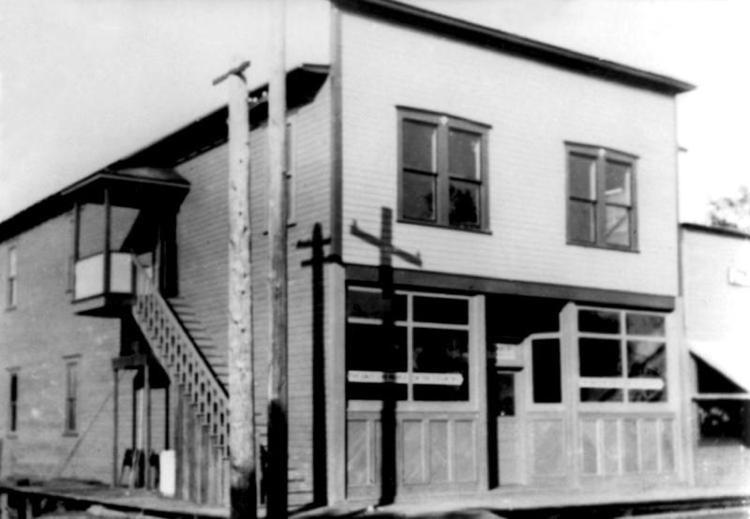
1908. Olympic Club (Courtesy South Whidbey Historical Society)
Built at the urging of a Seattle promoter, it was financed by a group of local businessmen, and constructed by local contractor Albert Melsen. Called the "Olympic Club," it was designed to hold boxing, wrestling, and other sporting events. The promoter promised to buy the structure when completed.
A grand opening on Labor Day was scheduled for September 8. It was to feature boxing, wrestling and billiard exhibitions by famous individuals. Steamships brought patrons from Seattle and Everett. One eyewitness estimated the holiday crowds at 1,000 people. Tickets to the fights, and memberships in the club, were sold in advance.
It was a disaster. The promoter realized he didn't have enough money to pay the star attractions. He left town with the receipts including money to pay for the return boat trip. Hundreds were stranded on the island until boats arrived the next morning.
With the building complete but without a buyer, local lawyer Hugh McLeod took up quarters there until 1909.
1911 - 1916: Langley Mercantille
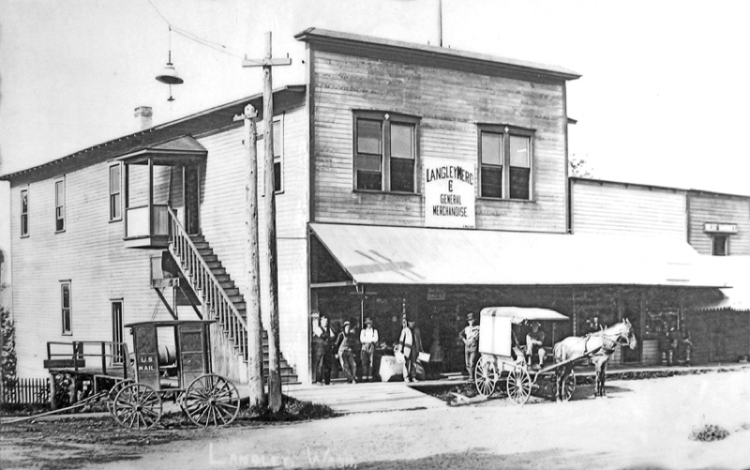
1913. Langley Mercantile and General Merchandise Store (Courtesy SWHS)
When his store across the street burned in 1911, Ed Howard relocated the post office and his mercantile business to the first floor and renamed the building the "Langley Mercantile and General Merchandise Store." The post office remained housed in the building with Ed Howard as postmaster until 1915 when a new post office was built on the south side of First Street. Ed's son-in-law Walter Hunziker and his brother William ("Bob") managed the store from 1912 to 1915 when "Bob" decided to go to Alaska.
1916 - 1937: Howard's Confectionary
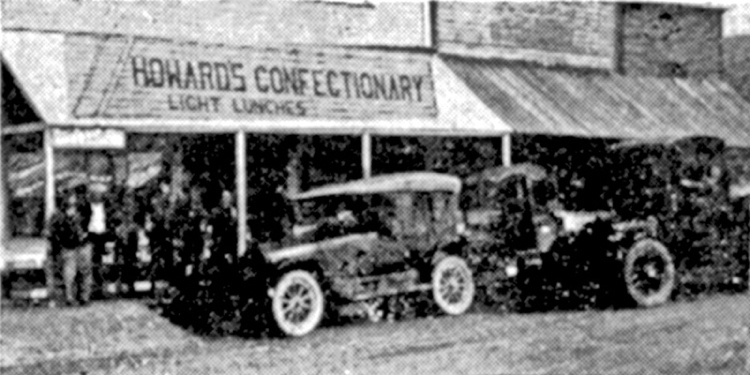
Circa 1922. Howard's Confectionary (Courtesy SWHS).
When the Hunziker brothers went out of business in 1915, Ed Howard turned the first floor of the building into a confectionary and pool hall that his son William eventually operated. The wife of William's brother Fred, gave birth to a daughter in the Confectionary in 1919.
A gymnasium in the basement (the "apple box") featured boxing and wrestling matches, and was used for many years as the high school gymnasium. The top floor of the structure featured an auditorium with stage, where the local men's club and temperance society met, local theatrical and musical productions were staged, and school graduation ceremonies and community dances held. The auditorium was also the town's movie theater from 1922 to 1937, prior to construction of the Clyde Theater across the Street. The gymnasium deteriorated and was ripped out in the 1930s.
1937 - 2010: Dog House Tavern
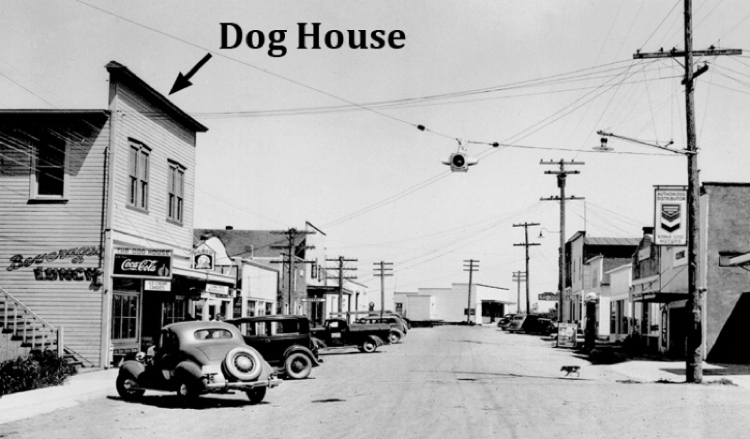 1940's. Dog House Tavern (left) on First Street (Courtesy SWHS).
1940's. Dog House Tavern (left) on First Street (Courtesy SWHS).
Following William's death in 1937, the retail space was converted into a tavern and named the "Dog House Tavern" by William's wife Vella. A family restaurant was added on the first floor in 1983. It continued to serve as a local entertainment spot, with performers ranging from jazz artist Art Foxall (in the 1950s) to rock performers like Country Joe McDonald. Although the gymnasium was removed (except for dressing rooms), and new windows were opened in the rear in the 1950s, the building retained much of its original character. Several businesses also operated upstairs over the years.
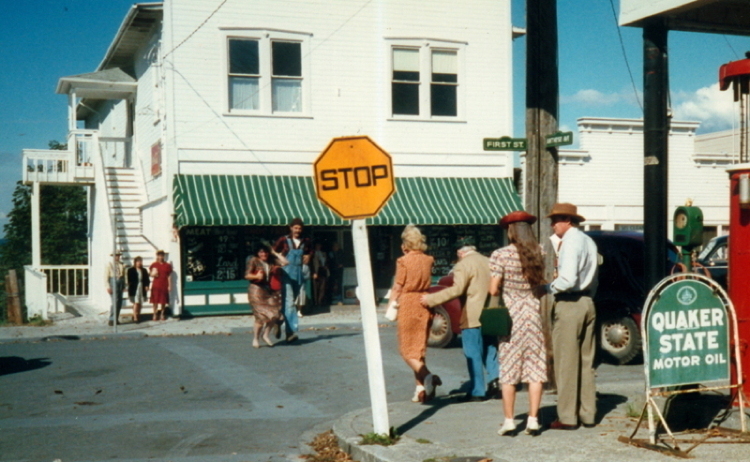
1986. (Courtesy Julie Jacobs).
The building was painted white in 1986 for filming a movie called "Dixie Lanes." Many people from the community were extras. "They had 1940s cars in the middle of First Street and a big fan. They said 'Action' and everybody came running out of the Dog House and everywhere, and the fan blew leaves and stuff; it looked like a hurricane."(Loudon Fraser) According to bookstore owner, Josh Hauser, when the production company ran out of money, "they left town without re-painting a lot of places."
2010: Building sold
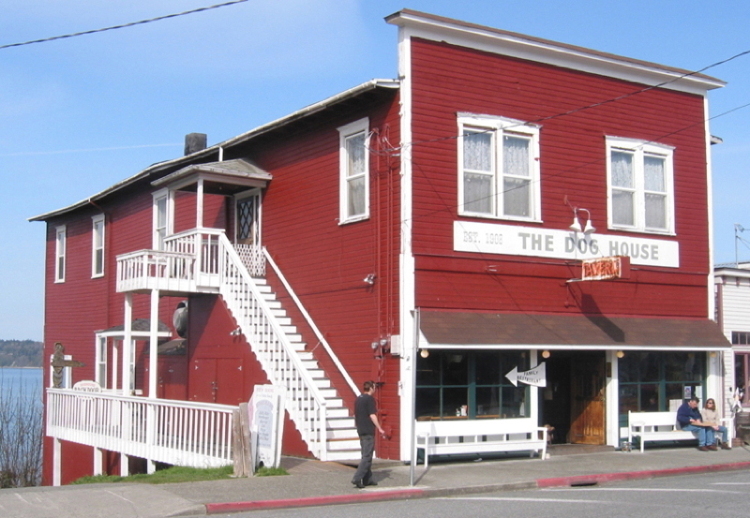
2004. Dog House Tavern (Courtesy R. Waterman).
The Tavern and restaurant continued operation under several owners until sold in 2010. It was considered by many locals as their "living room," and is the only one of the original buildings constructed at the intersection of First Street and Anthes Avenue that was not lost to fire over the years. It was placed on the National Register of Historic Places in 1991. Renovations to the historic structure began in 2018, including removal of the stairs and landing on the west side.
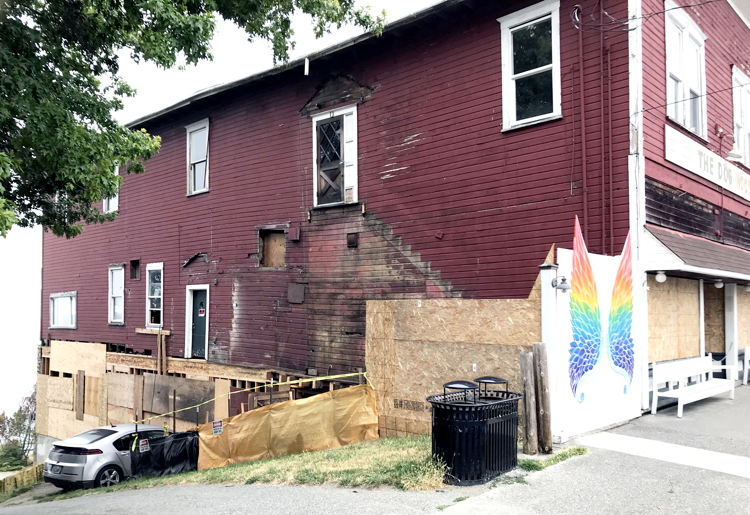
2018. West side of the Dog House Tavern (Courtesy Robert Waterman).